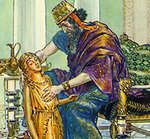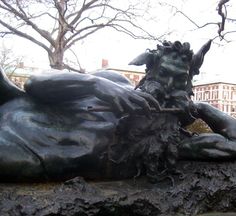
King Midas
The son of Gordias and Cybele – or at least their adopted child – Midas was the not-so-smart king of Phrygia who is today popularly remembered as the man with the golden touch. Supposedly, until he realized its disadvantages and renounced it, Midas possessed the capacity to turn everything he touched into gold, a gift given to him by Dionysus after the king had helped the god’s most beloved companion, Silenus. Midas is also famous for another divine gift: the asses’ ears, which he got from Apollo as a reward for his resolution to decide in favor of Pan at the Apollo vs. Pan musical contest.
The Golden Touch of King Midas
Midas was the king of Phrygia, who ruled over his people from a lavish castle encircled by a beauteous garden, in which – to quote history’s first historian, Herodotus – “roses grow of themselves, each bearing sixty blossoms and of surpassing fragrance.”
King Midas with Silenus
One day, some Phrygian peasants found a drunken old man in the garden’s vicinity and, after capturing him effortlessly, brought him to their king. Midas recognized him almost immediately: it was Dionysus’ oldest, wisest, and merriest reveler, the satyr Silenus!
So, instead of punishing him, Midas welcomed him in his palace, where his servants fed and entertained him for no less than ten nights. On the eleventh, Midas personally took Silenus back to his master, Dionysus, who, in gratitude for Midas’ hospitality, granted Midas one wish.
Midas' Wish
Now, Midas could have asked for almost anything, but he opted for a somewhat strange (though, at first sight, also imaginative) thing: he asked Dionysus that he should be able to turn into gold everything he touched.
His wish granted, Midas went away trying it out. He first turned some twigs into gold and then some stones. Afterward, he did the same to an ear of corn and some apples. There was no end to his rejoicing.
Midas' Dinner
Well, at least not until he got home and felt some hunger and some thirst. He suddenly realized that it was all but impossible to satisfy them: both his food and his drinks turned into gold as well, the minute they touched his mouth, his teeth, or his tongue.
Midas takes a bath
So, Midas had no option but to go back to Dionysus and ask the god to take away his gift. “No problem,” said Dionysus, “you just need to wash yourself in the River Pactolus.” Midas went to Sardis, ancient-day Lydia – where Pactolus still flows today (near the Aegean coast of Turkey) – and did exactly that, passing on his gift to the river. In fact, this is why the sands of Pactolus are golden-colored to this very day.
“King Midas Has an Ass’s Ears…”
The River Pactolus rises from the Mount Tmolus (modern-day Bozdag) which is where the second of Midas’ great misfortunes occurred.
Namely, Mount Tmolus was the site where the musical contest between Apollo and Pan occurred, with the god of the mountain (also named Tmolus) acting as the judge. To the surprise and dissatisfaction of no one present – including Pan himself – Tmolus declared Apollo the winner, but Midas, who just happened to be passing by from there, foolishly interfered, claiming that the decision is not right.
Apollo's Punishment
Apollo had only one explanation for Midas’ disagreement: “Boy, that man must have the ears of an ass,” he exclaimed before the crowd. To add insult to injury, Apollo made sure that everyone is aware of this right off the bat, transforming Midas’ human ears into long, grey hairy ears of a donkey.
Midas was, naturally, ashamed of them, which is why he started wearing different types of headdress or a specific kind of royal turban even when he was sleeping in his bed. However, it was impossible for Midas to hide his secret from his barber, who, of course, had to swear an oath of absolute secrecy – one which he was unable to bear. So, to get rid of his terrible burden, the barber dug a hole one night and whispered his secret into it, filling it up carefully afterward and tiptoeing away from it.
Months passed, and soon some reeds grew on top of this spot. And the moment the first breeze ruffled them, they started murmuring Midas’ secret to the whole world: “King Midas has an ass’s ears… King Midas has an ass’s ears…”
King Midas in Popular Culture
Due to King Midas' ability to turn everything he touched into gold, in popular culture, the expression "(he's got the) Midas Touch" is used to describe a person who has a proven track record of making a lot of money in different businesses and ventures. Also, in online betting, a sportsbook or casino bettor with a proven track record of winning big amounts of money by betting online in e.g. sportsbook live betting, slots or casino table games is also described as having the Midas' Touch in Betting. In fact a number of online casino slots games are named after King Midas like KA Gaming's Midas Touch!
King Midas Sources
You can read the full story of Midas in the eleventh book of Ovid’s “Metamorphoses.” For some minor supplements, see Herodotus’ “Histories” as well.
See Also: Silenus, Pan, Dionysus, Apollo
King Midas Video
King Midas Q&A
Link/Cite King Midas Page
Written by: The Editors of GreekMythology.com. GreekMythology.com editors write, review and revise subject areas in which they have extensive knowledge based on their working experience or advanced studies.
For MLA style citation use: GreekMythology.com, The Editors of Website. "King Midas". GreekMythology.com Website, 20 Oct. 2022, https://www.greekmythology.com/Myths/Mortals/King_Midas/king_midas.html. Accessed 26 April 2024.




